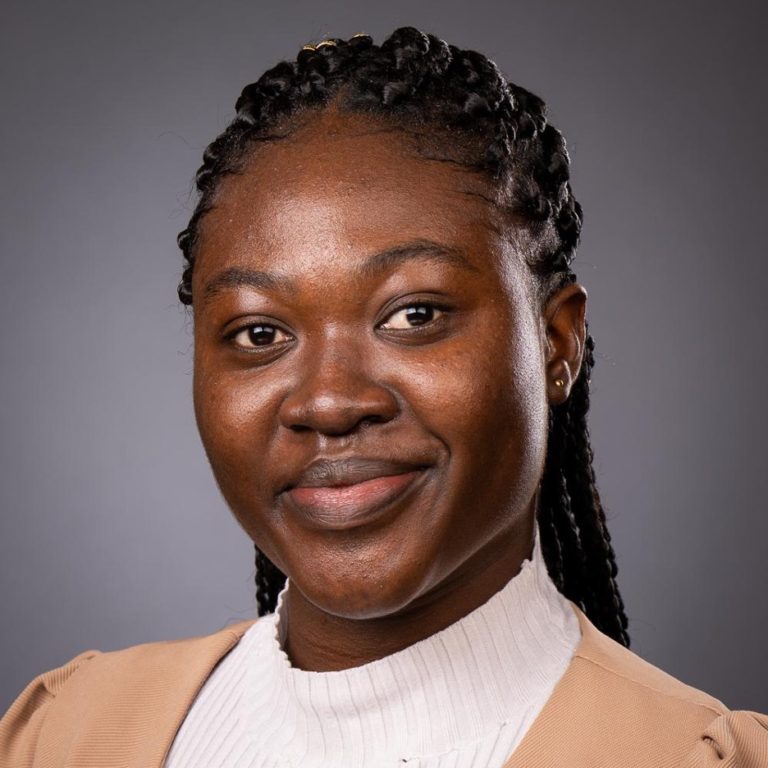
by Kamila Kinyon
This Spring we will be publishing a series of spotlight articles about multilingual students and faculty at DU. These articles are based on interviews that Dr. Kamila Kinyon and a group of multilingual students conducted about interviewees’ lived experiences, including continuing connection to heritage languages, role as writers and teachers at DU, and thoughts about multilingual and multicultural identity. This project is funded by a Faculty Research Fund Grant awarded to Dr. Kinyon for 2023-25. We welcome this opportunity to celebrate DU’s multilingual community.
An international student from Ghana, Stephanie Yamoah is pursuing her graduate degree in the Department of Geography where she is studying how climate solutions address gender equity. Stephanie relates that in growing up she “was surrounded by the rich cultural tapestry of the Akan people.” She grew up in the Greater Accra region in a community that speaks Ga. However, since her mother primarily speaks Twi and her father primarily speaks Fante, she sees these as her heritage languages: “Twi and Fante…are deeply intertwined with my sense of heritage and ethnic background.”
At school in Ghana, Stephanie and her classmates were required to speak English only: “If you spoke your native language it was termed as you speaking vernacular…And the punishment for that is you probably have to walk around the campus and pick any rubbish you see, or you have to sweep the class when school is over or you get lashed.” Despite this lack of linguistic justice in school, Stephanie relates that she still viewed English positively, since she learned it from her father who would read news articles to her in English and select stories for her to read.
The indigenous languages that Stephanie was forbidden from speaking in the classroom nevertheless remained essential to her life and work. She used these both to communicate with family members and to speak with informants when conducting ethnographies. For example, Stephanie’s Fante background helped her to build trust, since informants from the central region of Ghana perceived her and her father as insiders when they came as ethnographers into their communities to do fieldwork about sustainability: “I used my local language and my local name Efua (meaning) a Fante female born on a Friday. People…were like, oh, so you’re a native, you are from this region, it’s good to have you. They referred to me as their daughter and that made my data collection very easy.”
Stephanie eventually decided to continue her education in the U.S. due largely to DU’s strong program in geography and the environment, an emphasis she notes “aligns perfectly with my research interest.” One of the biggest educational differences for her was the intense workload associated with a single quarter-long class. She relates that as an undergraduate in Ghana she “could take probably six…or nine courses in a semester.” By contrast, at DU, taking two or three graduate courses and teaching Environmental Systems constitutes a full workload, especially in combination with publishing scholarly articles.
When asked about what it’s like to write articles about her fieldwork in English, Stephanie shared some of the challenges that this entails: “I conduct the interviews in the local language because that way it’s easy for the participants to express themselves. But then, when it comes to writing, you have to translate everything into English… You end up losing some of the words or some of the phrases because they can’t be captured in English.” Stephanie then exemplified this through a passage from her thesis: “the local people refer to mangroves as ‘insuduro’ (local Fante name for mangrove). If I break it down, ‘insu’ means water in Fante and ‘duro’ is medicine. So if I was trying to just do a direct translation, ‘insuduro’ would mean water medicine. What the local name truly means is that mangroves are medicine for wetlands (beneficial for the health of coastal ecosystems) due to their ecological benefits and functions.” This is the type of nuance that inevitably becomes lost in translation.
Overall, Stephanie has enjoyed her time at DU, and she feels that DU effectively supports multilingual students through multicultural events at Korbel: “I get to see people from different regions like all over Africa, all over Asia and America as well.” Stephanie would like DU to “identify the diverse languages…that are here and see if they could offer courses for those languages.”
In her concluding remarks, Stephanie emphasizes: “It’s important we embrace our multilingualism, because it’s a valuable asset that can enhance our academic and our personal life…Our unique perspectives as multilingual individuals enrich our academic community, and that’s what makes us vibrant and connected to the world.”
